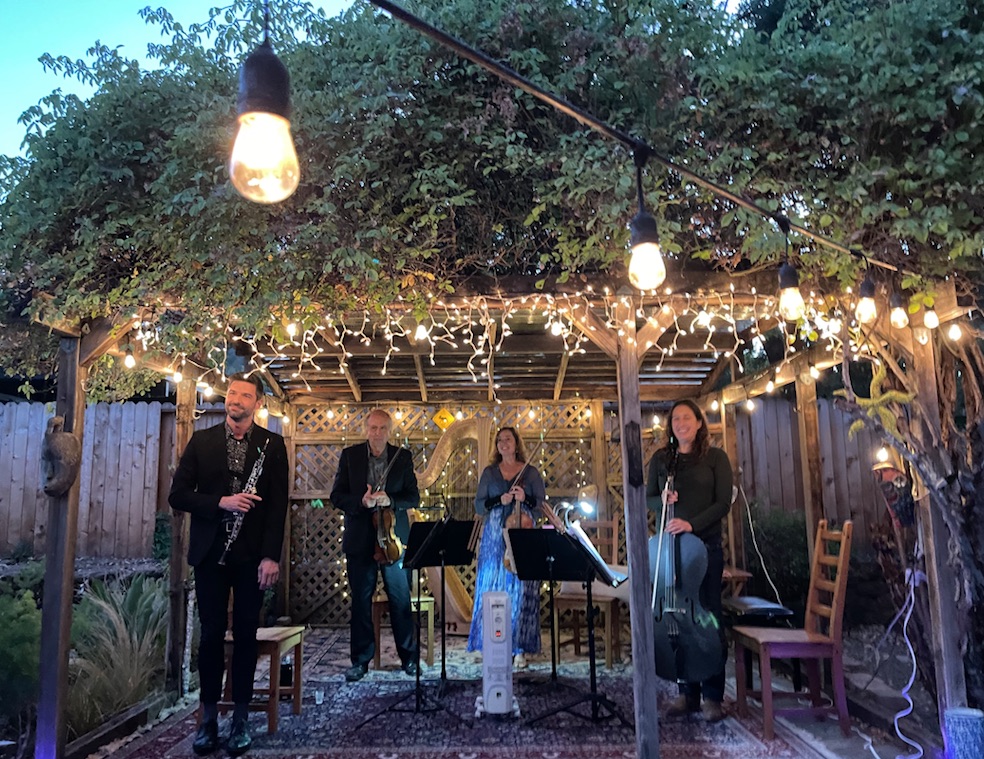Devon House Concert
Sparkling Music en Plein Air
Take a mild autumn evening, a garden gazebo with patterned rugs and lit with soft bulbs, shake in a fine chamber ensemble, add a rising new moon, and you have a recipe for the musical delight that violist Elizabeth Prior presented Oct. 9 in her Devon House Garden Concert series.
The Marin Terra Linda program featured violinist Joseph Edelberg; Jesse Barrett, oboe; flutist Stacey Pelinka; Rebecca Roudman, cello; Ms. Prior and guest artist harpist Chloe Tula. All but Ms. Tula are Santa Rosa Symphony members, and Ms. Prior is also a founding member of the Farallon Quintet. The 50 guests in the garden found comfortable seating on a variety of sofas and chairs.
The acoustics from the gazebo were surprisingly good, and a neighborhood chorale of chirping crickets swelled into hearing each time the music faded, enhancing the richness of the outdoor experience.
Pastorale, the first movement of Debussy’s intricate, polytonal Sonata for Flute, Viola and Harp, opened the evening. The performance was melancholy and sweetly uplifting. In 1915 Debussy was vacationing in a Normandy coast cottage, where he experienced a burst of creativity, writing three seminal works for cello, violin, flute, viola and harp. This concert’s Sonata, at that time a unique alchemical marvel, was played elegantly and with gracious ensemble.
Next was Ellen Taaffe Zwilich’s Oboe Quartet from 2004, scored for oboe, viola, violin, and cello, a fortuitous discovery for Jesse Barrett, who had not known the work before Ms. Prior spotted the score at Marin’s Magic Flute music store, and presented it to him. He in turn suggested they perform it at her Devon House series. Rounded out by Ms. Roudman’s resonant cello and Mr. Edelberg’s assertive violin, the quartet’s two movements balanced musical abstraction with expressiveness. As performed, it was an exuberant exploration of sound, juxtaposing quiet, suspended moments with dynamic rhythms, pairing string tremolos with the oboe’s mournful singing, and layering unison pizzicato with drawn-out melodies. It was a scintillating performance and the audience showed its appreciation with sustained applause.
In remarks to the audience Ms. Pelinka explained that Mozart wrote his Quartet for Flute, Violin, Viola and Cello in D Major, K. 285, in 1777, but before he had a full appreciation of the flute as an instrument. “You can hear parts of his operas [here],” she said, adding that “in this quartet, the violin line gets to be the bird, rather than the flute.” It was heavenly, joyfully flowing music. There are three movements: a jubilant Allegro, a haunting Adagio and a spritely Rondo, the last launched into without pause. Ms. Roudman’s and Ms. Pelinka’s playing was particularly virtuosic in the third movement, as their instruments often sang together while the viola and violin provided sympathetic harmonies in pizzicato.
Ms. Tula was the soloist for Carlos Salzedo’s Ballade for Harp, Op. 28 (1914). Salzedo was a French harpist, composer and conductor, and perhaps the most eminent harp composer in the 20th century. The Ballade showcases the instrument’s versatility and Ms. Tula’s command of the complicated score. It’s rare to hear classical solo harp and the arc of the piece was not immediately discernable. Rather, on first hearing it produced many special moments: arpeggios, strumming, glissandos, bisbigliando, subtle harmonics, plucking. Altogether it was a thrilling cascade of intricate and layered sound, and at times the surprise was that only two hands and two feet (to play the seven pedals) were involved in the performance.
The festive evening concluded with Mozart’s Quartet in F major, K. 370/368b, scored for oboe, violin, viola and bass violin or cello. Mozart had recently heard virtuoso oboist Friedrich Ramm, and as Mr. Barrett explained in introductory remarks, Ramm “played higher and faster than anyone else.” This opened possibilities to the composer, and he composed the music for Ramm to show the oboist’s virtuosity and the improvements that had been made to the oboe at that time.
The quartet includes a "high F" above the staff, a note rarely played before, and lots of rapid-fire passages which Mr. Barrett handled with finesse. The judicious tempo was such that every passage had clear articulation and distinct shape. After hearty applause, the audience joined the musicians for conversation and enjoyed the Devon House’s generous offerings of snacks, Perrier, and wine.
Published in classicalsonoma.org on Oct. 12, 2021
